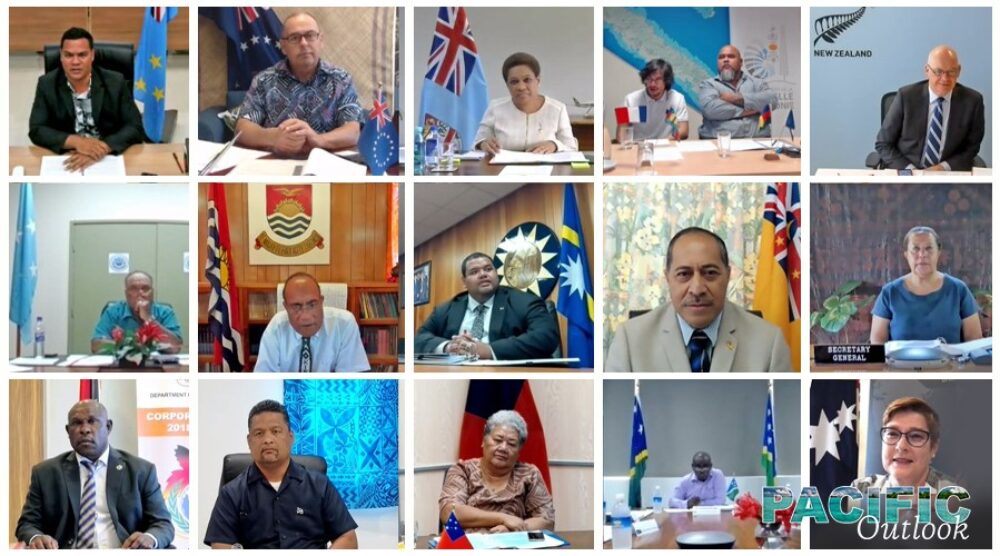Last week, the Foreign Ministers of the Pacific Islands Forum met as one of the standing committees of the inter-governmental organisation. As is the way of things in 2020, they convened online.
All 18 members of the Pacific Islands Forum (PIF) were represented. It is a quirk of Pacific politics that in some countries the leader of the government is also the minister who holds the portfolio for foreign affairs. So, around the e-table there were heads of government, ministers, senior officials and a number of observers, including representatives of regional organisations.
The meeting was chaired by Hon Simon Kofe who is the Minister of Justice, Communications and Foreign Affairs of Tuvalu. Although this meeting has only been part of the regional agenda since 2015, it is a significant gathering. Not least because one of its functions is to finalise the agenda for the meeting of Forum leaders (more on this later).
Unsurprisingly, the meeting was dominated by the impacts of COVID-19 on the region. Whilst the health impacts in Pacific island countries have been comparatively minimal, the same cannot be said of the economic and social fallout. The closure of borders has seen businesses close, food security threatened, and citizens unable to return to their homes owing to a lack of connectivity.
Building on their previous work of establishing the Pacific Humanitarian Pathway – COVID (PHP-C) the ministers have tasked the Pacific Islands Forum Secretariat to take forward discussions around the development of a PHP-C Regional Quarantine Facility. They have also recommended to Forum leaders a draft “Pacific Islands Forum Leaders Statement on COVID-19” with a view to it being presented at the Special Session of the UN General Assembly on COVID-19 in December of this year.
Notwithstanding the huge impacts of COVID-19 on the Forum membership the Foreign Ministers reiterated the pre-eminence of the impacts of climate change as a regional priority. Consistent with previous positions, including recent statements from regional leaders, the Ministers called on the international community to meet or exceed the commitments made under the Paris Agreement in 2015. This is of particular significance as all signatories are expected to produce renewed ‘Nationally Determine Contributions’ (NDCs) by the end of this year. The Republic of Marshall Islands has already completed this process and linked their revised NDC to their national energy policy. Ministers restated their support for the “Kainaki II Declaration for Urgent Climate Change Action Now” that was issued at last year’s Leaders’ meeting in Tuvalu.
There is a strong expectation that Pacific countries will play an important role in COP26 and with that in mind the Ministers called for more political engagement and greater advocacy in the lead up and during this global meeting. The Ministers have called on the One CROP Plus team to source funding to support appropriate levels of participation by senior Pacific political leaders and champions for the duration of the process.
Whilst the expectation was that the Forum leaders would review a draft of the “2050 Strategy for the Blue Pacific Continent” the year that is 2020 has intervened. The foreign ministers have endorsed a revised workplan for the strategy and this work will continue under the guidance of a sub-committee that is chaired jointly by Fiji and Vanuatu.
Hon. Simon Kofe confirmed to the post-meeting press conference that it is still expected that the Forum leaders will meet in a special online retreat. The Pacific Islands Forum Secretariat is in the process of liaising with members to determine when this will take place, with the first week of November looking likely.
As expected, the Leaders will work with a much-reduced agenda. The two topics that they will discuss are the impacts of COVID-19 on the region and the appointment of the next Secretary-General.
This latter issue is already shaping up to be something of a thorn in the side of the regionalism project. Hon. Simon Kofe confirmed that this is a ‘sensitive issue’. He also confirmed that the Foreign Ministers were very concerned about the potential threat to regional cohesion if the Micronesian countries were to leave the PIF should their candidate not be endorsed. He advised that a circular was to be issued to Forum members providing options as to the way forward on the position of Secretary-General post January when Dame Meg Taylor’s tenure comes to an end.
Maintaining key regional conversations without the opportunities afforded by face to face meetings is no easy task. Whilst it is apparent that this meeting has been able to keep some of these conversations going, there are other aspects of regional policy making that have been referred to the December meeting of Forum officials.
Now we await the special meeting of Pacific Islands Forum Leaders. In a year such as this, will there be more surprises to come?
Tess Newton Cain is an Adjunct Associate Professor at the Griffith Asia Institute and project lead of the Pacific Hub.








